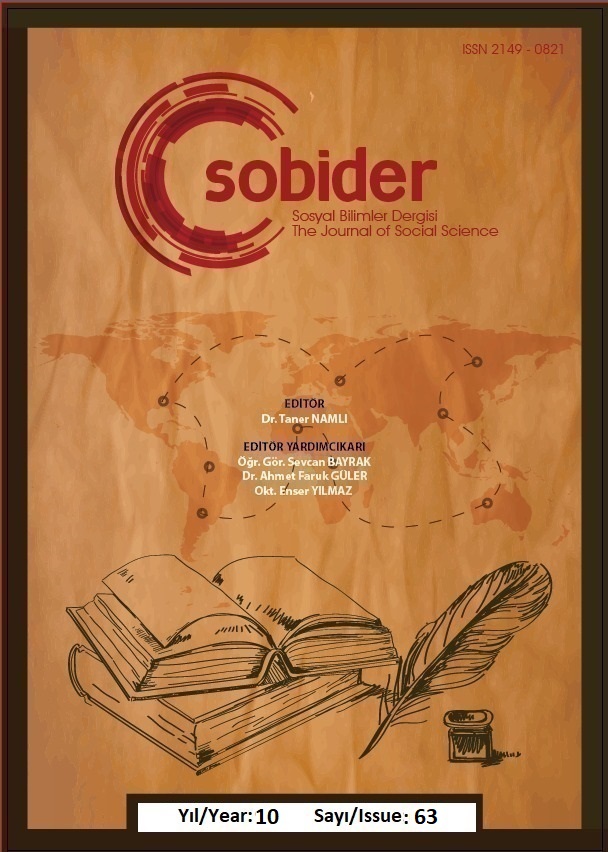Author :
Abstract
Özellikle ilkokullarda Fen Bilimleri derslerinde öğrencilerin konuları anlamada zorlandıkları düşünüldüğünde öğretilecek konuları daha eğlenceli, basit ve zihinlerinde konuları anlamlı bir şekilde yapılandırarak etkili ve kalıcı bir şekilde öğrenmelerini sağlar. Bu literatür taramasıyla yapılan araştırmanın amacı öykü temelli öğrenmenin ilkokul 3. Ve 4. sınıflarda Fen Bilimleri dersinde uygulanmasının öğrenciler ve öğretmenler üzerindeki etkilerinden bahsetmektir. Araştırmanın hedefini gerçekleştirmek için gerek yaşanmış örnek olaylardan, gerekse Fen Bilimleri dersindeki konularla ilgili özgün öykü örneklerinden faydalanılacaktır. Öykü çocukların daha ilkokula başlamadan ve okuma yazma bilmedikleri zamanlarda hayatlarına girer. Ebeveynleri ve ana sınıfı öğretmenleri çocuklara onların yaş gruplarına hitap eden öyküler okur. Daha o yaşlardan çocuklarda öykü sevgisi başlar. Öykünün çocukların hayatında çok başka bir yeri vardır. Okuma yazma bilmeyen küçük yaştaki çocuklar bile içgüdüsel olarak kitapları ellerine alarak renkli sayfalarına bakmaktan ve resimlere anlamlar yüklemekten zevk alırlar. Öğretmenler, öğrencilerin öykü sevgisini dikkate alarak öğrenciler açısından karmaşık ve zor gibi görünen, öğrenciler için soyut kalan derslerin anlatımında öykü yöntemini kullanarak bu dersleri öğrenciler açısından somutlaştırarak kolaylaştırabilir. Öğrenciler derslerde pasif dinleyici olmaktan kurtularak aktif hale gelebilir. Öykü Tabanlı Öğrenme yaklaşımıyla öğrenciler açısından sıkıcı gibi görünen ve öğrenilmesi aşılması çok zor bir dağ gibi görünen zor dersler kolayca öğretilebilir ve öğrencilerin derslere bakış açısı değişebilir. Öğrenciler bu derslerde bu yöntemle eğlenecekleri için dersleri renkli ve eğlenceli görerek dersleri sevmeye başlayabilir. Öykü Tabanlı Öğrenme yaklaşımı tek başına kullanılabileceği gibi sunuş yoluyla öğretimle, buluş yoluyla, öğretimle ve daha birçok yöntemle birlikte de kullanılabilir. Öykü Tabanlı Öğrenme etkinliği sonucunda öğrenciler dinledikleri öykü ile ilgili soru cevap yapılabileceği gibi drama yöntemiyle dinledikleri veya okudukları öyküyü canlandırabilirler, öyküdeki kahramanları resmedip karikatür çizebilirler, dinledikleri öykünün konu içeriğine göre eğer uygunsa farklı bakış açıları kazanabilmeleri için altı şapkalı düşünme tekniğini renkli şapkalar kullanarak uygulayabilirler. Yine konunun içeriğine göre sergi yöntemiyle öğrendikleri konularla ilgili yaptıkları materyalleri sergileyebilirler.
Keywords
Abstract
Considering that students have difficulties in understanding the subjects in science lessons, especially in primary schools, it enables them to learn the subjects to be taught in a more fun, simple and effective way by structuring the subjects in their minds in a meaningful way. The aim of the research conducted with this literature review is to talk about the effects of the application of story-based learning in the 3rd and 4th grade science lessons on the students and teachers. In order to achieve the aim of the research, both real-life case studies and original story examples related to the subjects in the Science course will be used. The story enters the lives of children before they start primary school and when they are illiterate. Parents and kindergarten teachers read to children stories that appeal to their age group. The love of stories begins in children from that age. The story has a very different place in the lives of children. Even illiterate young children instinctively enjoy holding books in their hands, looking at the colored pages and assigning meaning to the pictures. Taking into account the students' love of stories, teachers can make these lessons easier for students by using the story method in the narration of the lessons that seem complex and difficult for the students and remain abstract for the students. Students can become active by getting rid of being passive listeners in the lessons. With the Story-Based Learning approach, difficult lessons that seem boring for students and a very difficult mountain to learn can be taught easily and students' perspectives on lessons can change. Since students will have fun with this method in these lessons, they can start to love the lessons by seeing the lessons as colorful and fun. The Story-Based Learning approach can be used alone or in conjunction with teaching by presentation, discovery, teaching and many other methods. As a result of the Story-Based Learning activity, students can do questions and answers about the story they listen to, they can play the story they listen to or read with the drama method, they can paint the heroes in the story and draw cartoons. Again, according to the content of the subject, they can exhibit the materials they have learned about the subjects they have learned through the exhibition method.





